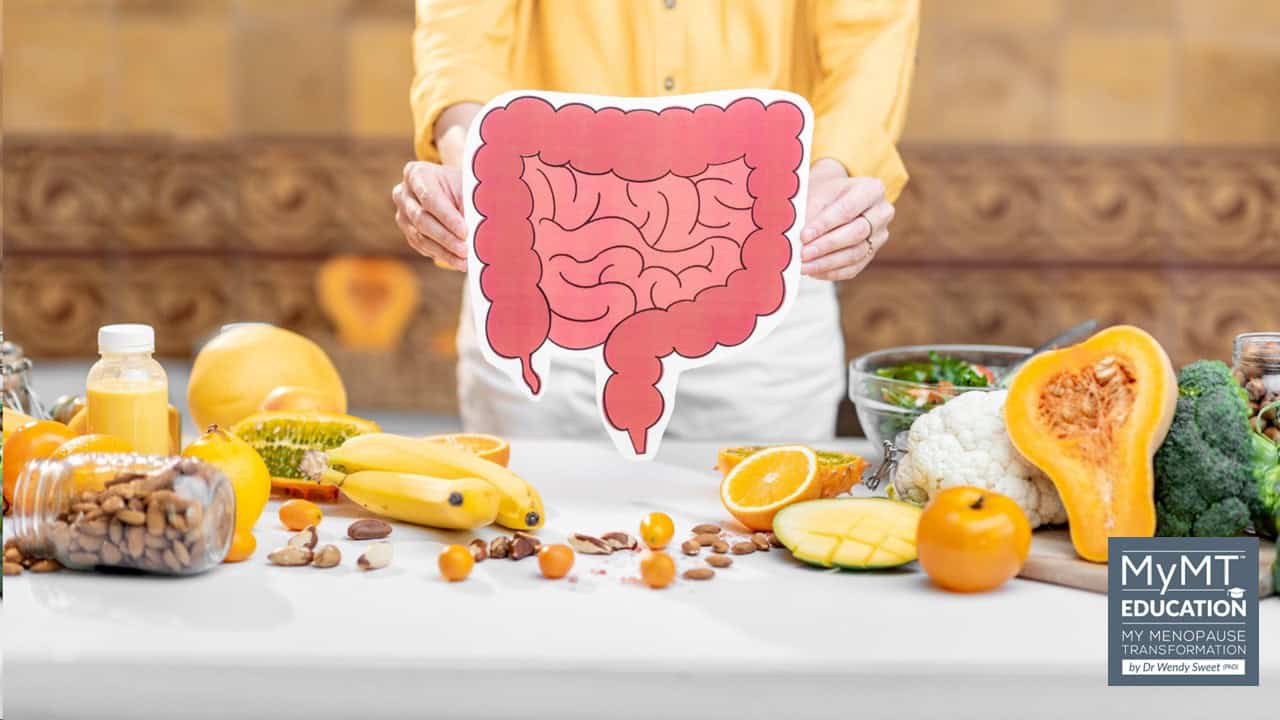Knowledge about how the gut-microbiome alters aspects of our immune, metabolic and nervous system health has increased 10-fold over the past decade and fortunately, some of this knowledge has also been situated in midlife women’s health.
Whilst this increase in research has been mainly due to improved genetic research, it’s also arrived from advances in microbial technology. Both have opened the door to better understanding of gut health and the link to inflammatory diseases as we get older.
While talking about gut health to your clients may not be in your Scope of Practice, it’s important to have some insight into this new research, so you can advise clients on alternative treatments that they may consider, if they are struggling with their temperature regulation, depression and/or their weight as they navigate their menopause transition.
In western countries Irritable Bowel Syndrome [IBS] is 4 times more common in women as they reach mid-life – also a time of our lives, when menopause symptoms may cause so much frustration. With my own gut health changing when I reached my early 50s, it made sense to me that these issues may well be related.
As it turns out they are, and with the huge number of women on my 12 week lifestyle programmes mentioning that they feel that their gut health has changed since arriving in menopause, I wanted you to understand this better too.
In recent years, researchers have demonstrated that oestrogen/estrogen and its receptors serve an important role in the gastrointestinal (GI) tract. As such, when oestrogen levels begin to decline, this may contribute to the progression of a number of GI diseases in women, including gastroesophageal reflux, oesophageal cancer, peptic ulcers, gastric cancer, inflammatory bowel disease, irritable bowel syndrome and colon cancer.
Prior to menopause, oestrogen was cycling up and down in a monthly rhythm. As such, the higher levels of oestrogen helped the gut enzymes to work more efficiently.
The role of enzymes in the gut is important.
Enzymes produce chemical reactions in the body. For example, there are enzymes that help our digestive processes. When you eat that bit of bread, amylase is the enzyme that breaks down the starch in it. Amylase is present in your saliva.
Another enzyme called pancreatase, also assists in digestion. This is produced by our pancreas to help break down fats and proteins.
When women move from peri-menopause into menopause, and oestrogen levels decline, the production of these enzymes is reduced. Unfortunately, whilst Menopause HRT achieves changes in other areas of the body, it doesn’t affect enzyme production in the gut.
This is part of the reason why many women find that their Menopause HRT isn’t helping their gut health. They may also find that over time, as their gut health changes more, then the ability of their HRT to help regulate their temperature may decline as well.
Only since 2015, have researchers begun to understand that oestrogen has a role in helping the gut epithelium or lining to turn over cells regularly. According to Dr Marek Glezerman, author of ‘Gender Medicine’ which explores the gender differences in health and disease,
“Functional Disorders of the digestive tract, such as Irritable Bowel Syndrome (IBS) is four times more common in women living in Western countries during and after menopause. In Japan, China, India and other parts of Asia, the ratio is the opposite.”
The nature of menopausal symptoms is common to all women, however, geographical location and ethnicity influence the prevalence of certain symptoms. (Hunter, Chedraui et al., 2012). This bought my attention to the possible link between our changing gut health and the frequency of severity of hot flushes, weight gain and other symptoms.
Another important realisation about changing gut health during menopause, is the link between certain types of microbes that reside in our colon and how these impact health problems, including temperature regulation, as women age.
For example, in women with menopause-related osteoporosis, scientists have discovered that the microbial organism called Prevotella may be protective against this life-changing bone disease.
And when it comes to women’s heart disease, it seems that optimal numbers of Lactobacillus Casei may help to reduce vascular stiffness which is associated with women’s ageing blood vessels during and after menopause which can contribute to high blood pressure (hypertension) which in turn may lead to worsening hot flushes in post-menopausal women. [Maas, 2020; Siddiqui et al, 2022].
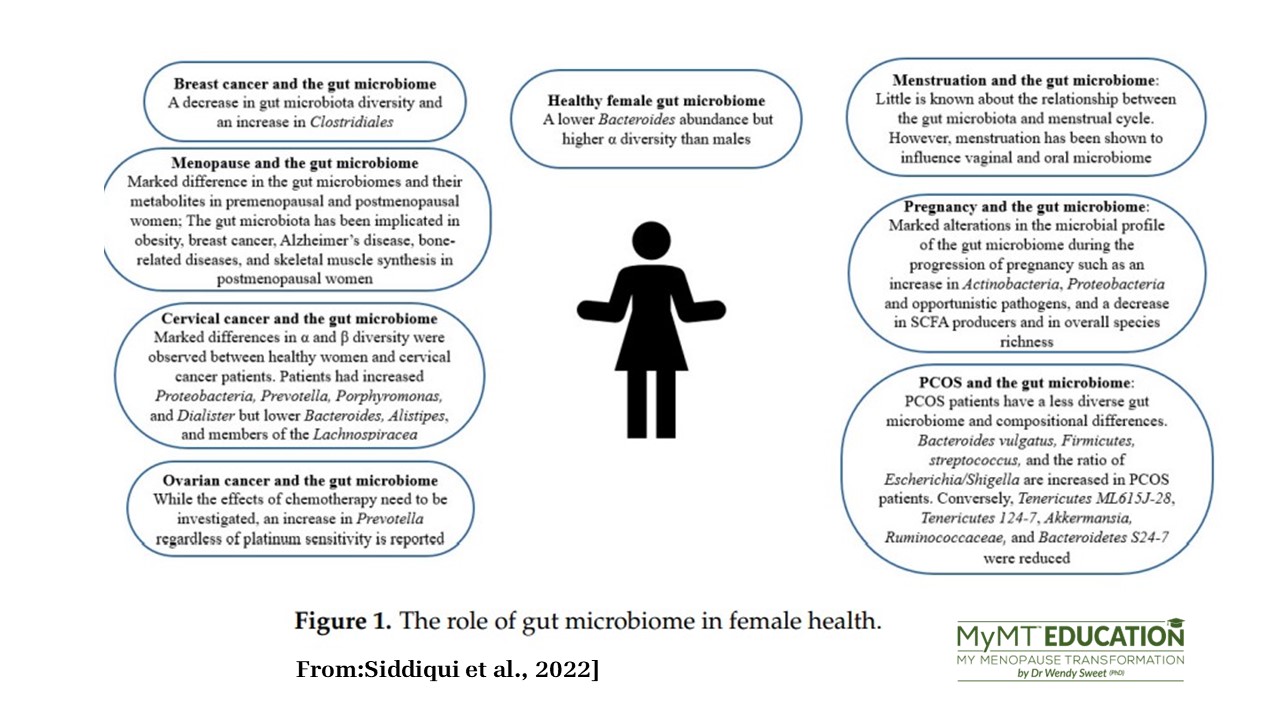
Unnatural shifts in the gut microbiota composition, known as dysbiosis, can lead to several health disorders. Knowing that one of these disorders is to do with temperature regulation problems, is important for women transitioning into and through menopause.
That’s why, whether your clients are on menopause HRT or not, looking after their gut health is an important lifestyle strategy to consider as part of their symptom management too.
Numerous factors impact gut function over our lifetime.
This includes our diet, environmental changes (extreme heat and cold), antibiotic exposure, sleep disturbance, physical activity (too much or not enough), hormonal changes and pathological or disease stimuli – all of these factors cause a shift in the gut microbiota. Hormonal changes during menopause are included in this list too.
‘One of the factors that plays a pivotal role in microbiota modulation, although broadly understudied in current research, is the change in female sexual hormones throughout life, including menopause.’ [Veira, A., Castelo, P. et al, (2017)]
This is why the role of oestrogen in gut health is more important than we think. Throughout our life, and more so after puberty, oestrogen helps to keep inflammation in our intestines at bay. It does this by preventing what is known as ‘leaky gut syndrome‘.
Researchers have discovered that dysregulation of oestrogen receptors in the intestinal mucosa of patients with Crohn’s Disease and Ulcerative Colitis indicates that oestrogen signaling plays a role in the local immune response in the intestine, helping to maintain the integrity of the gut lining, called the epithelium.
The interesting thing is that this is known to occur in a gender- and age-dependent manner (Jacenik, et al. 2019). So, for women transitioning through menopause, from their mid-40s on, the decline in oestrogen levels impacts gut health. This may result in a leaky gut and dysbiosis from a changing microbiome.
In turn, the subsequent inflammatory changes in the bowel can increase the frequency and severity of hot flushes and contribute to weight gain as the gut enzymes are affected and dysregulation of lipids (fats) may occur. (Ko & Kim, 2020).
When inflammatory changes are present in the body, the natural defence mechanisms are to try to cool the body down. Hence, when we are sick or have a fever, we begin to sweat.
This is why, both Hot flushes/flashes and night sweats are a sign that the body is trying to cool down and a sign of temperature dysregulation. Researchers now believe that this may start in the gut with an altered microbiome (Huus & Ley, 2021)
It’s no surprise to me that many menopause supplements have ingredients that are known to improve the gut microbiota … but my challenge to you, as a Health Practitioner is, what advice might you be giving your clients about the role of diet in their temperature regulation and their gut health?

How is your client’s gut health? Do you ask them?
If you have clients experiencing Irritable Bowel Syndrome (IBS), diverticulitis, constipation and/or loose bowel movements, then chances are that they have a gut-health problem.
What we, as Practitioners, need to understand, is that poor gut health is also known to contribute to foggy-brain, anxiety, depression and weight gain as well as osteoporosis and muscle health concerns.
Numerous women on my programmes tell me that they are experiencing gut health issues that have mainly arrived since they went into their menopause transition.
The gut microbiome is one of the largest organs in the body (along with our skin) and most importantly, the gut is responsible for producing 70% of our energy.
There is also a powerful connection between the gut microbiome and brain health (which is why our gut is now referred to as our ‘second brain’), therefore many symptoms that women experience in menopause, such as foggy brain, depression, anxiety and mood swings can also be linked to the health of their gut micro-biome. I might also add insomnia in there too.
With this increasing scientific evidence about gut health and menopause, here are 3 strategies to get you started on sorting out your client’s gut health naturally.
- Menopause hormonal changes cause gut motility (called peristalsis), to slow down. Understanding this means that your client’s should slow down the amount and frequency of their food intake, especially if weight loss is desired. Portion control is important as is overnight fasting for 12-14 hours. This allows time for the food already in the gut to be digested. Depending on the type and amount of food, digestion can last for as long as 19-20 hrs.
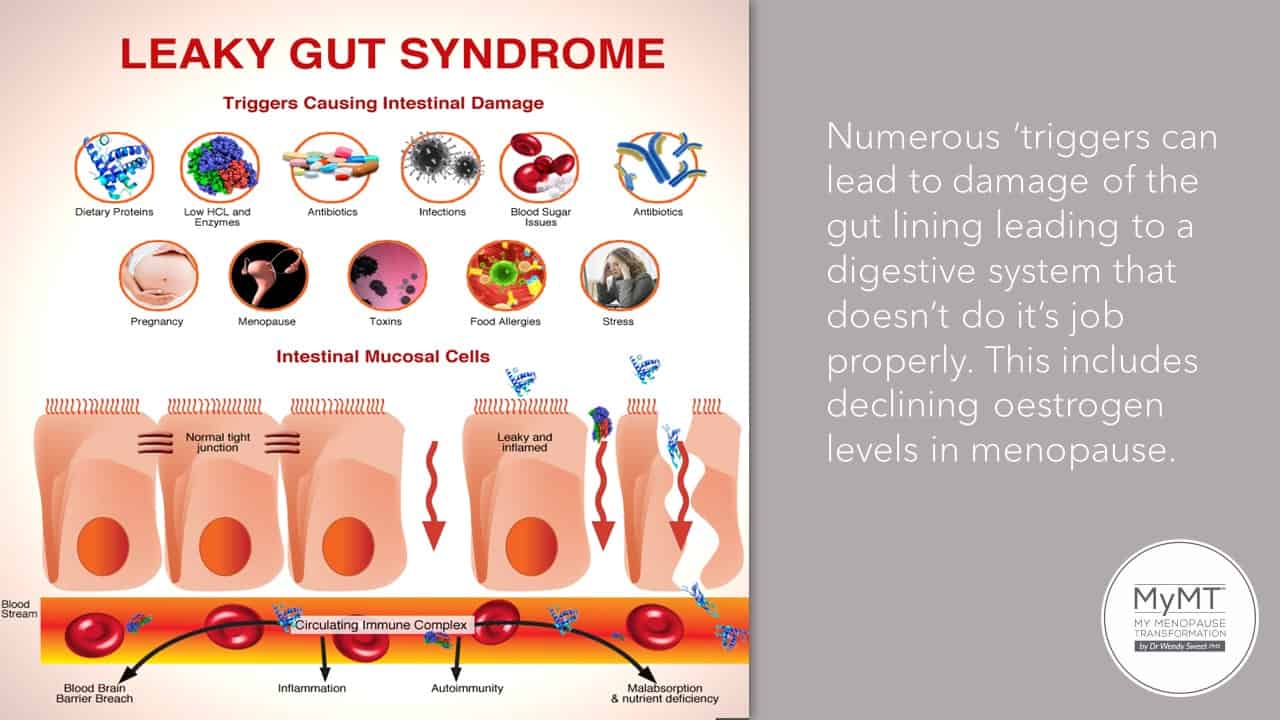
2. Clients shouldn’t be in extreme heat or cold environments. This is difficult with climate change in many countries, especially for those women living in northern parts of Australia. Environmental temperature and heat stress are known to modify the gut microbiome. Changes in core temperature have been linked to altered microbiome composition and function. Extreme summer heat causes worsening gut health. (Hylander & Repasky, 2019).
The opposite is true for women living in countries that have extremes in cold, such as in Canada. As such, thinking about reducing exercise intensity in extreme heat or cold environments, matters as well. That’s a double-whammy for worsening gut health during menopause.
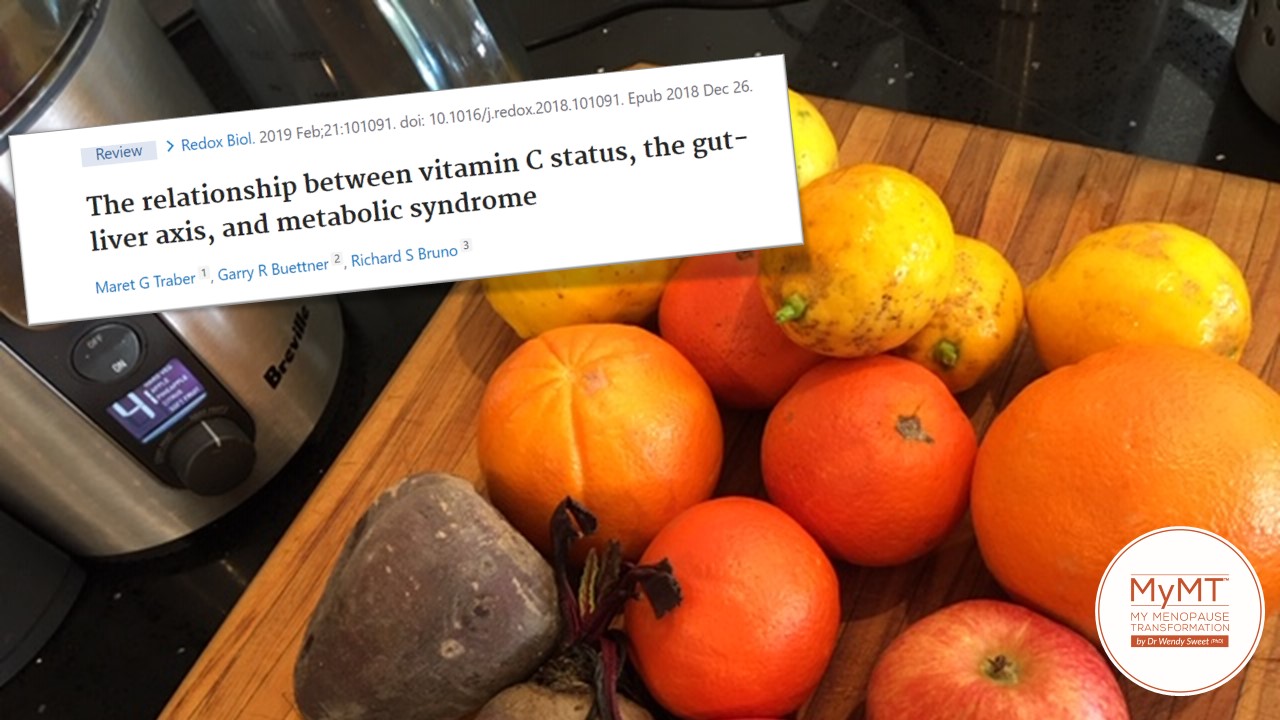
3. Restrict fats and increase Vitamin C intake. New research reports that high fat diets mimic the effects of a western diet (Lobionda, Sittipo et al, 2019) and this increases bowel inflammation. Hence, the type of fat that women have matters, as are the foods that supply the gut microbiota with good bacteria. Prebiotic foods are rich in dietary fibres.
So, encouraging your clients to diversify their dietary intake with fruit, vegetables, wholegrains, and pulses, is important. The body can’t digest these fibres, so they travel to the gut where they feed the good bacteria that make butyrate.
This is a primary nutrient that is physiologically produced by the microbial fermentation of dietary fibres. It plays a functional role in maintaining the integrity and function of the intestinal cells. (Leonel & Alvarez-Leite, 2015).
Furthermore, studies also indicate that Vitamin C is needed to help prevent Intestinal bacterial overgrowth. This can be a complication of the increased visceral fat that can arrive during menopause. (Traber, Buettner et al, 2019).
New research is also emerging about the role of the gut microbiome in certain women’s health problems, so having foods that increase certain healthy microbes in the gut and reduce harmful microbes is an interesting and emerging research purpose, so watch this space and I talk more about this in the MyMT™ Education Practitioner Course.
For example, new evidence on the connection between changing gut microbes and women’s health issues suggests that the microbes, Lactobaccillus casei and Lactococcus lactis help to alleviate vascular malfunction and arterial stiffness in overweight post-menopausal women [Siddiqui, Makhlouf et al., 2022].
Two foods that supply these bacteria, include Green Olives and hard Cheese.
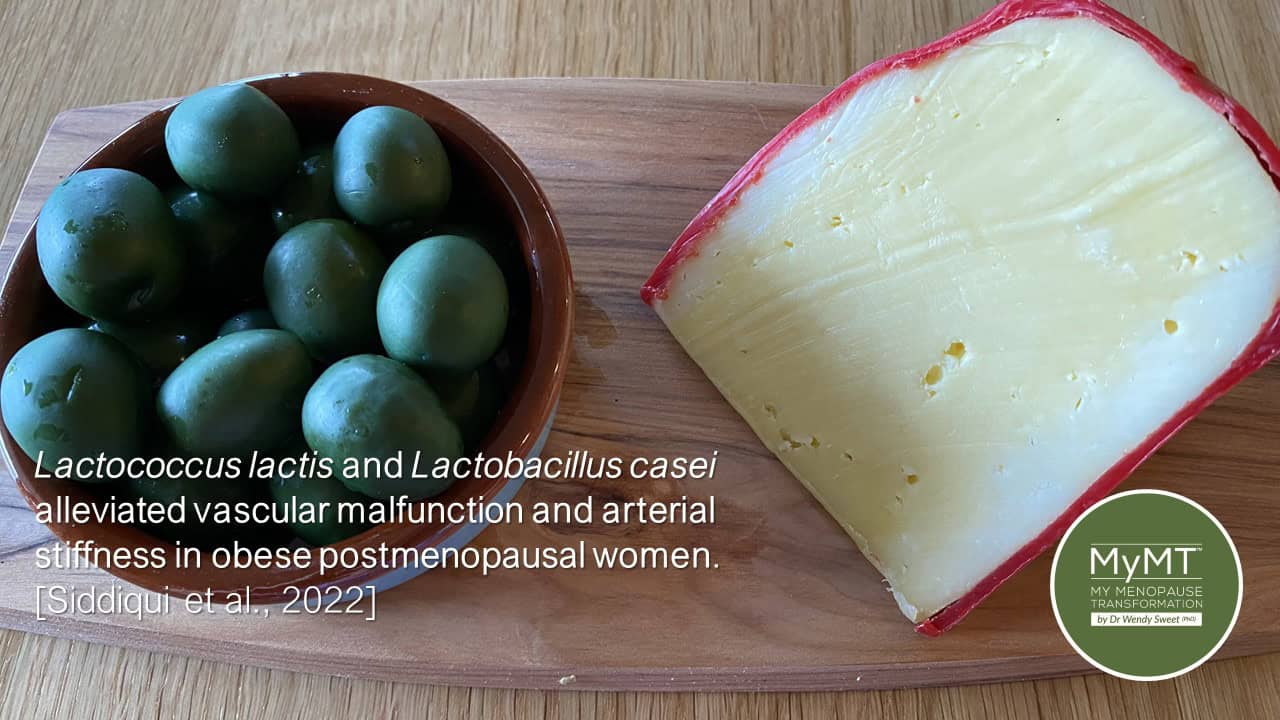
4. The brain thermostat matters. All temperature changes are regulated in the brain, hence the circadian rhythm matters to women’s health as they move through menopause. I talk a lot about this in my Practitioner courses and in my own coaching programmes. Turning around circadian rhythm is crucial for gut health repair and for nutrient absorption, as the gut functions on a 24 hr circadian cycle too.

Dysbiosis (an imbalance) of the gut microbiota in menopausal women is mainly due to changes in oestrogen levels as we age, but there are other factors to consider with your clients too.
These factors include:
- stress (past and present)
- insomnia
- living in extreme climates
- history of medication use (including antibiotics)
- alcohol consumption
- poor diet
- high-fat diet
- long-term oral contraceptive use
- over-exercise
- overweight or obese status
Whilst all Gastro-intestinal symptoms should be evaluated promptly and aggressively by your client’s medical Doctor, please be aware that bloating can be a sign of a much more serious problem like certain cancers, ovarian cancer, pancreatic cancer, liver disease, inflammatory bowel disease, bowel obstruction, diverticulitis, infectious causes, amongst many other conditions.
But if all is OK and clear with your clients’, then helping them to get on top of their gut health concerns can be life-changing.
If you would like to know more about gut health, then I also invite you to explore my stand-alone module on gut health. I tell you about it in the video below.
Dr Wendy Sweet (PhD)/ Member: Australasian Society of Lifestyle Medicine.
References:
Agnoletti D, Piani F, Cicero AFG, Borghi C. The Gut Microbiota and Vascular Aging: A State-of-the-Art and Systematic Review of the Literature. J Clin Med. 2022 Jun 20;11(12):3557.
Chen C, Gong X, Yang X, Shang X, Du Q, Liao Q, Xie R, Chen Y, Xu J. The roles of estrogen and estrogen receptors in gastrointestinal disease. Oncol Lett. 2019 Dec;18(6):5673-5680. doi: 10.3892/ol.2019.10983.
Glezerman, M. (2016). Gender Medicine. Duckworth & Co Publ.
Hunter, Myra & Chedraui, Peter & Blümel, JE & Tserotas, Konstantinos & Aguirre, W & Palacios, S & Sturdee, David. (2012). The International Menopause Study of Climate, Altitude, Temperature (IMS-CAT) and vasomotor symptoms. Climacteric : The Journal of the International Menopause Society. 16. 10.3109/13697137.2012.699563.
Hylander, B. & Repasky E. (2019) Temperature as a modulator of the gut microbiome: what are the implications and opportunities for thermal medicine?, International Journal of Hyperthermia, 36:sup1, 83-89, DOI: 10.1080/02656736.2019.1647356
Jacenik, D., Cygankiewicz, A. I., Mokrowiecka, A., Małecka-Panas, E., Fichna, J., & Krajewska, W. M. (2019). Sex- and Age-Related Estrogen Signaling Alteration in Inflammatory Bowel Diseases: Modulatory Role of Estrogen Receptors. International journal of molecular sciences, 20(13), 3175. https://doi.org/10.3390/ijms20133175
Ko SH, Kim HS. Menopause-Associated Lipid Metabolic Disorders and Foods Beneficial for Postmenopausal Women. Nutrients. 2020 Jan 13;12(1):202. doi: 10.3390/nu12010202.
Leonel, A. & Alvarez-Leite, J. (2012). Butyrate: implications for intestinal function. Review, Lippincott, Williams and Wilkin, 15 (5), 1-6.
Madison A, Kiecolt-Glaser JK. Stress, depression, diet, and the gut microbiota: human-bacteria interactions at the core of psychoneuroimmunology and nutrition. Curr Opin Behav Sci. 2019 Aug;28:105-110.
Monteleone, P., Mascagni, G., Giannini, A. et al. Symptoms of menopause — global prevalence, physiology and implications. Nat Rev Endocrinol 14, 199–215 (2018). https://doi.org/10.1038/nrendo.2017.180
Nie, X., Xie, R. & Tuo, B. (2018). Effects of Estrogen on the Gastrointestinal Tract. Dig Dis Sci 63, 583–596.
Peters BA, Santoro N, Kaplan RC, Qi Q. Spotlight on the Gut Microbiome in Menopause: Current Insights. Int J Womens Health. 2022 Aug 10;14:1059-1072.
Siddiqui, R.; Makhlouf, Z.; Alharbi, A.M.; Alfahemi, H.; Khan, N.A. The Gut Microbiome and Female Health. Biology 2022, 11, 1683. https://doi.org/10.3390/biology11111683
Traber M., Buettner G., Bruno R. (2019). The relationship between vitamin C status, the gut-liver axis, and metabolic syndrome. Redox Biol. 21:101091.
Veira, A., Castelo, P. et al, (2017). Influence of oral and gut microbiota in the health of menopausal women. Front. Microbiol. 8: 1884.
